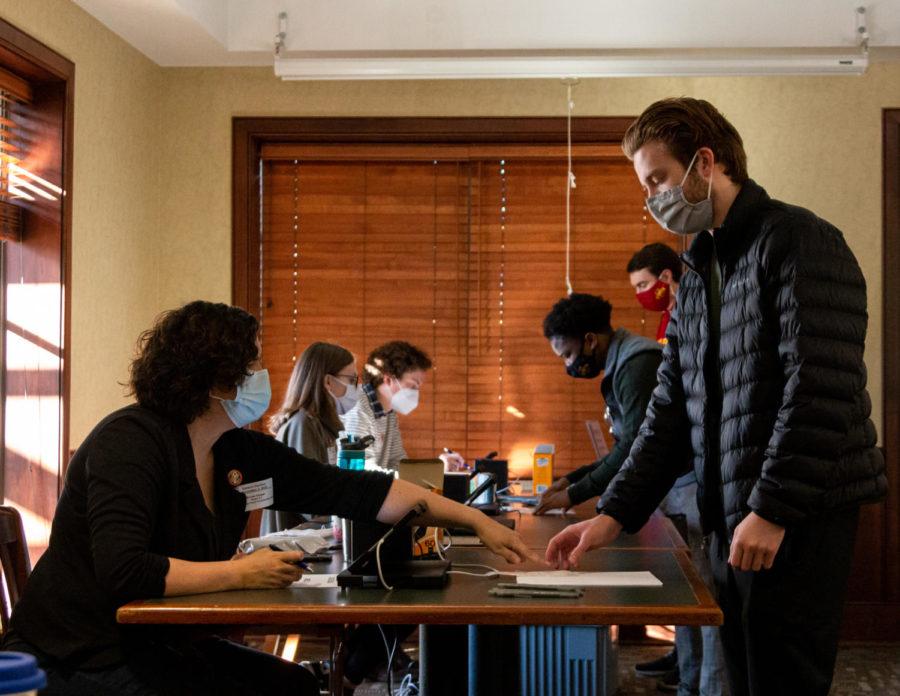Senate Democrats continue to push for election reform
August 26, 2021
As the Senate takes their annual month-long recess, Democrats shift gears making election reform a priority when Congress returns to Capitol Hill in mid-September.
The For the People Act of 2021 passed the House of Representatives in early March but failed in the Senate on party lines in June. Now Senate Democrats are strategizing how to overcome the Republican wall.
Democrats have garnered zero support from Republicans. Confronted with the barrier, some Democrats have proposed throwing out the filibuster allowing a simple majority vote to end the debate instead of a supermajority of 60 votes to allow for a vote.
More recently, the John Lewis Voting Rights Act passed the House Tuesday but is also unlikely to bypass the filibuster in the Senate.
Democrats are clenching on to their own 50 key votes like Sen. Joe Manchin D-WV. Manchin wrote an opinion piece opposing eliminating the filibuster and the partisan divide the For the People Act of 2021 has triggered.
Karen Kedrowski, director of the Carrie Chapman Center, said anytime the federal government has tried to change the time, place and manner of elections has been somewhat contentious.
The Constitution is clear, the authority to conduct elections is given to the states, but after the passage of the Fifteenth Amendment, the federal government started to define more specifically who voters are.
While the Fifteenth Amendment granted the right to vote for any American citizen regardless of race, color or previous condition of servitude, it did not eliminate barriers that prevented people of color from voting. Both the Fifteenth and Nineteenth Amendments were viewed as federal overreach on states rights’.
Barriers like literacy tests and poll taxes weren’t eliminated until the passage of the Voting Rights Act of 1965 and the Twenty-fourth Amendment, which also faced large opposition.
“Both of those were contentious for many of the same reasons and because the opposition to it largely weren’t using race to disenfranchise communities of color but were contriving other things such as literacy tests and residency requirements that were so onerous it effectively did the same thing,” Kedrowski said.
For the People Act of 2021 aims to expand voter registration through automatic and same-day registration while focusing on voting access through vote-by-mail and early voting. Another key factor included in the For the People Act of 2021 is independent redistricting committees.
Redistricting can play an important role in elections from the House all the way down to local elections. District lines need to be redrawn every ten years to ensure they are as close in size in population as possible. When districts are uneven, people who live in larger districts votes’ are relatively powerless in comparison to votes in less populous districts.
Kedrowski said the uneven outcome is called malapportionment. The greatest malapportioned legislative body would be the U.S. Senate, where smaller states like Wyoming and Vermont have the same power as California or Texas.
There are requirements for redistricting set by the Supreme Court besides population. Districts need to be geographically contiguous- in other words, they can’t cross bodies of water or skip areas. Townships should remain cohesive and shouldn’t be divided unless necessary.
“In addition to formal criteria, you also have some informal criteria,” Kedrowski said. “One of those is the protection of incumbents and the other one is that the party in control of the state legislature wants to maximize the number of seats that are either safe or competitive so that their party can remain in power.”
This often resulted in minority communities being placed in heavily concentrated areas, also known as packing, or being split up between districts known as cracking. Kedrowski said the purpose of these methods was to dilute their voting power.
“In many communities, this has meant that districts have become much more homogeneous both ideologically, socioeconomically and in terms of ethic and racial composition,” Kedrowski said.
State legislatures are typically the ones delegated with redrawing their own electoral districts, which Kedrowski noted can result in partisan gerrymandering, but there are states like Iowa and California that have independent committees to manage the redistricting for the state.
Kedrowski said the For the Peoples Act of 2021 is a good policy, but she doesn’t think it will instill confidence in the demographic of voters who doubt elections results.
“Those folks who doubt the integrity of the 2020 election are doing so based on an elaborate set of lies that were perpetrated by the former president and his allies, with no basis,” Kedrowski said.







